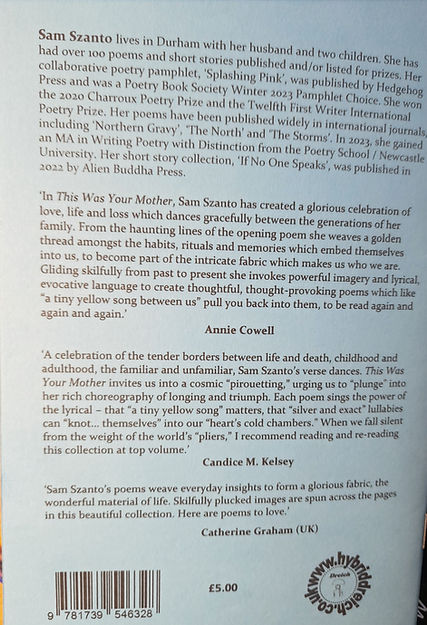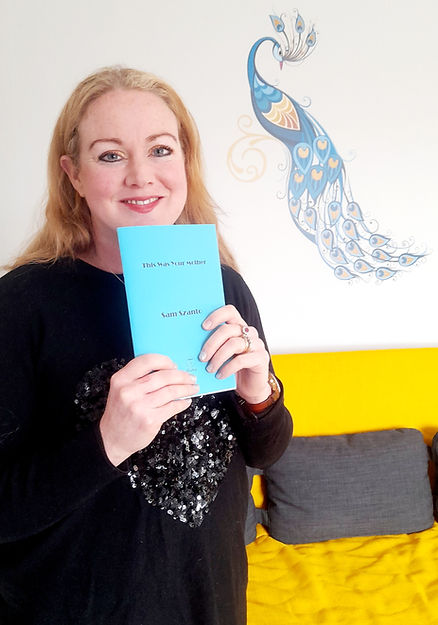'A Conversation-on-a-Conversation': How Splashing Pink was Born
- samszanto2
- Sep 16, 2023
- 6 min read
'Splashing Pink’ is a conversation-in-poems between Annie Cowell and me about our experiences of motherhood across the generations, published by Hedgehog Press in July 2023. Here we discuss how the poems were born, and what it means to write about children and childhood.

Sam: It was your brilliant idea to enter the competition, Annie. Do you remember what motivated you to ask me to do it with you?
Annie: When I spotted the Hedgehog Poetry Press’s competition asking for a poetic conversation between 2 poets, I was intrigued by the concept but a bit nervous as I’d never worked collaboratively before. Writing is generally a solitary business so the notion of working closely with someone else was both exciting and daunting. Your name came to mind immediately Sam. I’d come across your writing initially as we are part of the Alien Buddha Press family, with our debut books both being published by them in 2022. I’d read the short stories in ‘If No one speaks’ and loved everything about them; characterisation, writing style, the lot. Then, a while later I was doing some reading of poetry submissions for Fiery Scribe, and yours were amongst them. They jumped out of the screen at me, and of course ended up being published. So I knew you were a really good writer, and felt like our styles would work well together. I was very nervous when I approached you in case you said no, but luckily you were as keen on the idea as me!
What about you? Were you surprised when I asked you?
Sam: I was very flattered to be asked! I’d loved your pamphlet ‘Birth Motes’ and it did feel like there was a similarity between our styles of writing and the themes we seem to gravitate to. So I could see how a collaboration could work well, but I’d never done anything like that before either. I was nervous about letting you down and there was also a time constraint as we were contemplating the idea of writing up to 20 poems in, I think, less than a month?
Sam: Do you remember how the theme of the collection came about? It seemed to happen very naturally and of course, motherhood is something we have in common. I’m wondering if my memories are different from yours, though!
Annie: I remember that we spent some time brain storming things we were both interested in, things that we thought would lead to an interesting conversation. We were quick to recognise that we both write a lot about family, so we were gravitating to that idea, but weren’t sure how to start the conversation. Then, the terrible shooting of little Olivia happened in Liverpool and, as we followed what was happening each of us felt compelled to try and write about how we were affected by her death. You wrote ‘First Day of Term’ in response to those events and that became the starting point to which I responded with ‘First Day for Liz’. As we bounced poems back and forth between us, we realised that these weren’t really where the conversation began, and those poems ended up sitting in the middle of the book. They are about mothers we don’t know - a mum who suffered every mother’s worst nightmare, Elizabeth II and Liz Truss - and about events which were overwhelming in those moments, but which gradually fade over time. The book’s title, ‘Splashing Pink’ was inspired by Olivia’s mother, who asked everyone to wear a ‘splash of pink’ at her daughter’s funeral, to acknowledge her favourite colour. ‘Night-light’, my personal favourite in the book, became the obvious starting point because it was written about early motherhood - the beginning of the journey. Does this match your memory of how we began?
Sam: Yes… I think we considered writing about nature at first, then motherhood came up and as we have different experiences because of being different ages it seemed to be a topic that would work well.

Annie: One of the things I really like about the poems in what we lovingly call ‘Pinkie’ is that we haven’t just written about ourselves. ‘First Day for Liz’, for example, about Liz Truss (anyone out there remember her?) becoming prime minister and also being a mother, and being sworn in by her namesake Elizabeth II who died just a couple of days after the poem was written. How does it feel to you to write about others’ experiences of motherhood?
Sam: It's an interesting issue. I used to write a lot about other people’s experiences without really questioning it, then I started to think about the morality of telling stories that are not your own. It’s a complex issue, but I think if it’s done with kindness and compassion then it’s okay. I think in the context of our book specifically, it adds a texture and another layer of interest. I think when we write poetry, even if it’s about our own experiences, we’re still writing outside of ourselves, fictionalizing ourselves to a degree – and if you always write in the ‘I’ voice that stops that level of distance developing. I also just think it’s interesting to consider other people! I also think that with motherhood, although everyone has different experiences, when you talk to people who are mothers, particularly new mothers, the feelings are very similar – those almost overwhelming feelings of love and responsibility.
Sam: ‘The Eagle Nights’ is one of my favourites from the collection – I read it out to the older kids when I did World Book Day’ at my kids’ school as I thought it would appeal to them. It intrigues me, because it has so much heart yet a lot of surrealism too and I wondered if you could talk about that as a poetic technique?
Annie: Part of being a mother is trying to help our children overcome their fears, and most young children seem to have a phase where their imaginations run riot and create a whole host of terrors. I don’t know what triggered my daughter’s fear of eagles, but she really did have terrible, recurring nightmares about one being trapped in her bedroom and was so vivid that it almost seemed reality. ‘The Eagle Nights’ can be read literally or metaphorically, as a universal representation of those childhood fears - some real, some imaginary which often plague our children. The surreal element in the poem stems from the idea that those fears can become so overwhelming that even in sleep they can fly out of our imaginations and create genuine dangers. The symbolism of opening her ancient bedroom window and releasing the bird into the night represents how hard mothers struggle to free their children of their fears, the lengths we will go to to provide a solution.

Annie: One of the motifs which runs throughout the book is the sun and it features in two of my favourites, Night Light and The Sun Rises. Do you think sunrise is especially significant for mothers?

Sam: That’s an interesting idea that I’d never really considered, which is strange because as you say it features in those poems, and also in ‘Early Morning’ (my daughter used to confuse the words ‘sunrise’ and ‘sunset’). I think on a practical level, you see a lot of very early mornings when you have young children! Mine still get up very early. I suppose also there’s that symbolic level of a sunrise as a new start, which is what children are, and what you have when you give birth.
Sam: You write beautifully about your own childhood in ‘Brambling’ and ‘Sunday lunch rituals began on Saturday’. There seems a strong association between family meals and love in both poems?
Annie: Many of my childhood memories involve food and meal times and Mum was very much a central figure. In ‘Brambling’, I tried to capture how certain childhood activities eventually come to encapsulate the very essence of those times. For me brambling was an intrinsic part of late summer for many years and represents the freedom of older childhood, when you were able to venture out without parents. The foraging for the berries was the adventure, but taking them home to mum was also exciting, because we knew that they would be turned into something delicious. There was something deeply ritualistic about many of these everyday activities and this was especially true of our Sunday lunches. It was the highlight of the week, with dad providing the veg from his garden and mam transforming them into a feast. As we grew up and eventually left home the memory of those lunches became a nostalgic glow which we eagerly anticipated every time we visited. They’re the essence of what mothers do for us - feed and nurture and provide us with memories we can keep and pass on.
Sam: Absolutely. I think there’s such a strong association between food and love for children and parents. Most of my childhood memories revolve around food – from the after-church cornetto from the newsagent on Sundays to the roast dinner after that and watching my parents drink pre-prandial Campari to the teas my gran always did with the tinned vegetables that I found very exotic!
Sam: Finally, what’s next for you in the world of authordom? Are you working on another pamphlet or collection? Any more poems about motherhood about to be born?
Annie: Since we wrote ‘Splashing Pink’ I’ve relocated back to London for at least a year so that I can look after my grandson now that his mum has returned to work. I have a few ideas for another pamphlet and I’m hoping to find time to bring them to fruition. What about you?
Sam: I tend to flit between genres, so I'm querying my debut novel (also about motherhood!) as well as making pamphlet submissions. Very much looking forward to the creative future for both of us!










Comments